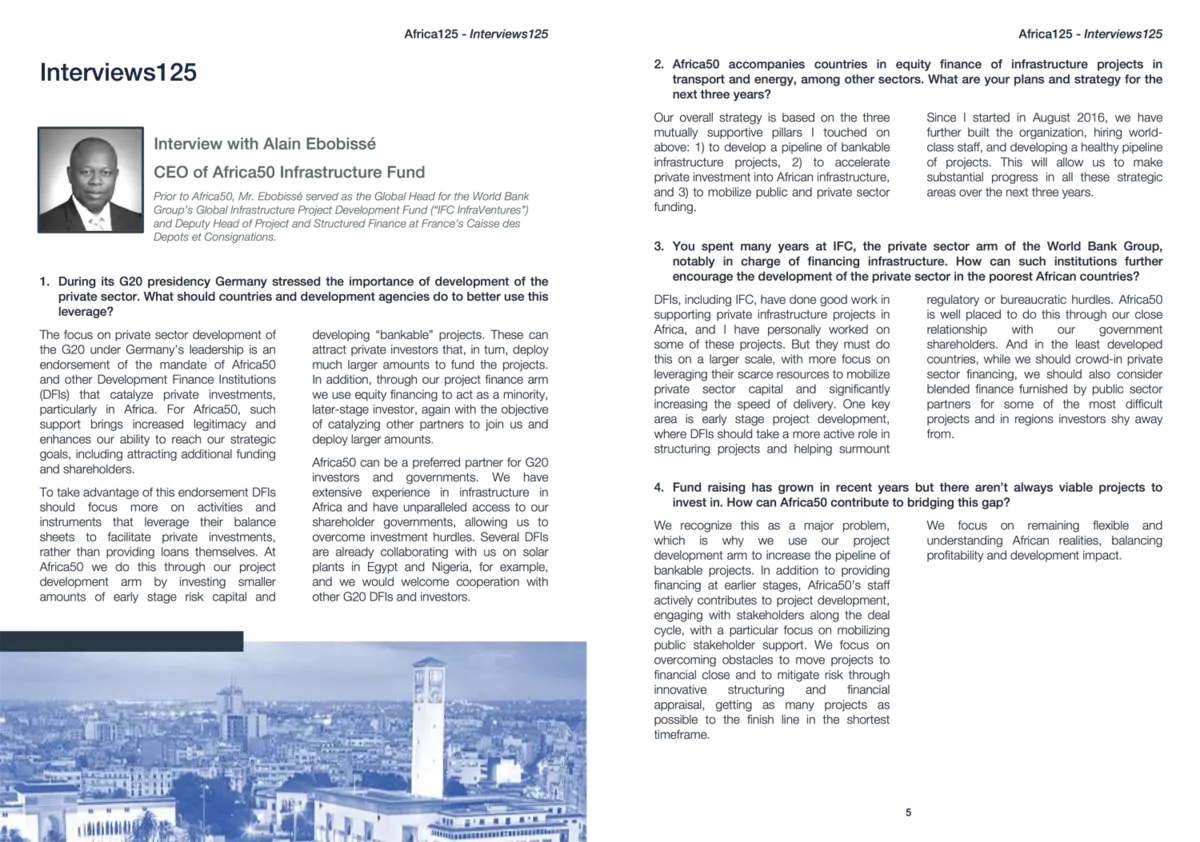Africa125 Newsletter interview with Alain Ebobissé
Interview with Alain Ebobissé, CEO of Africa50 Infrastructure Fund
Prior to Africa50, Mr. Ebobissé served as the Global Head for the World Bank Group’s Global Infrastructure Project Development Fund (“IFC InfraVentures”) and Deputy Head of Project and Structured Finance at France’s Caisse des Depots et Consignations.
1. During its G20 presidency Germany stressed the importance of development of the private sector. What should countries and development agencies do to better use this leverage?
The focus on private sector development of the G20 under Germany’s leadership is an endorsement of the mandate of Africa50 and other Development Finance Institutions (DFIs) that catalyze private investments, particularly in Africa. For Africa50, such support brings increased legitimacy and enhances our ability to reach our strategic goals, including attracting additional funding and shareholders.
To take advantage of this endorsement DFIs should focus more on activities and instruments that leverage their balance sheets to facilitate private investments, rather than providing loans themselves. At Africa50 we do this through our project development arm by investing smaller amounts of early stage risk capital and developing “bankable” projects. These can attract private investors that, in turn, deploy much larger amounts to fund the projects. In addition, through our project finance arm we use equity financing to act as a minority, later-stage investor, again with the objective of catalyzing other partners to join us and deploy larger amounts.
Africa50 can be a preferred partner for G20 investors and governments. We have extensive experience in infrastructure in Africa and have unparalleled access to our shareholder governments, allowing us to overcome investment hurdles. Several DFIs are already collaborating with us on solar plants in Egypt and Nigeria, for example, and we would welcome cooperation with other G20 DFIs and investors.
2. Africa50 accompanies countries in equity finance of infrastructure projects in transport and energy, among other sectors. What are your plans and strategy for the next three years?
Our overall strategy is based on the three mutually supportive pillars I touched on above: 1) to develop a pipeline of bankable infrastructure projects, 2) to accelerate private investment into African infrastructure, and 3) to mobilize public and private sector funding. Since I started in August 2016, we have further built the organization, hiring worldclass staff, and developing a healthy pipeline of projects. This will allow us to make substantial progress in all these strategic areas over the next three years.
3. You spent many years at IFC, the private sector arm of the World Bank Group, notably in charge of financing infrastructure. How can such institutions further encourage the development of the private sector in the poorest African countries?
DFIs, including IFC, have done good work in supporting private infrastructure projects in Africa, and I have personally worked on some of these projects. But they must do this on a larger scale, with more focus on leveraging their scarce resources to mobilize private sector capital and significantly increasing the speed of delivery. One key area is early stage project development, where DFIs should take a more active role in structuring projects and helping surmount regulatory or bureaucratic hurdles. Africa50 is well placed to do this through our close relationship with our government shareholders. And in the least developed countries, while we should crowd-in private sector financing, we should also consider blended finance furnished by public sector partners for some of the most difficult projects and in regions investors shy away from.
4. Fund raising has grown in recent years but there aren’t always viable projects to invest in. How can Africa50 contribute to bridging this gap?
We recognize this as a major problem, which is why we use our project development arm to increase the pipeline of bankable projects. In addition to providing financing at earlier stages, Africa50’s staff actively contributes to project development, engaging with stakeholders along the deal cycle, with a particular focus on mobilizing public stakeholder support. We focus on overcoming obstacles to move projects to financial close and to mitigate risk through innovative structuring and financial appraisal, getting as many projects as possible to the finish line in the shortest timeframe. We focus on remaining flexible and understanding African realities, balancing profitability and development impact.
Catégorie: Couverture de presse

